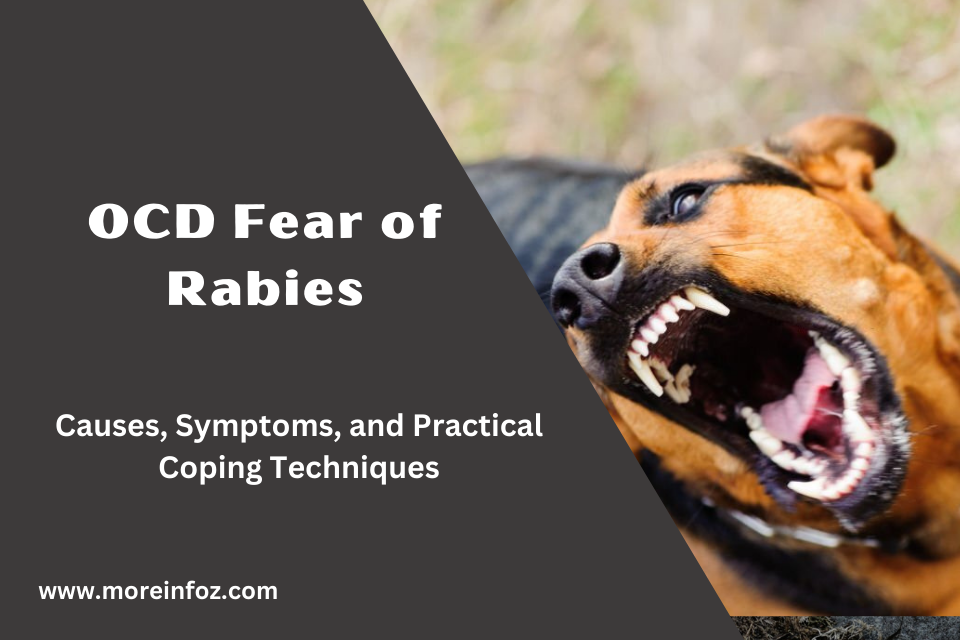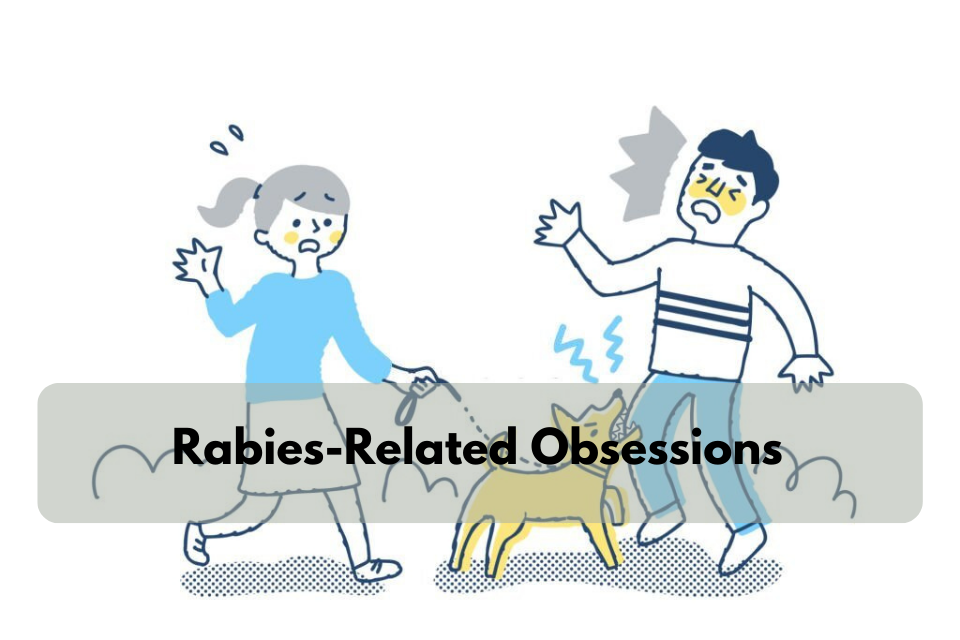OCD Fear of Rabies: Causes, Symptoms, and Practical Coping Techniques for Overcoming Rabies-Related Obsessions


The OCD fear of rabies is a specific manifestation of obsessive-compulsive disorder, where individuals experience intense anxiety and intrusive thoughts related to the fear of contracting rabies. This article aims to provide a comprehensive understanding of OCD fear of rabies, including its causes, symptoms, and practical coping strategies. By addressing this fear and implementing effective techniques, individuals with OCD can manage their anxiety and regain control over their lives.


1. Understanding OCD Fear of Rabies
OCD fear of rabies is characterized by obsessive thoughts and compulsive behaviors related to the fear of contracting rabies, even when the risk is minimal. These individuals may engage in excessive handwashing, avoidance of animals, repeated checking for signs of rabies, and constant seeking of reassurance.
2. Causes of OCD Fear of Rabies
The causes of OCD fear of rabies are multifaceted. They can include a combination of genetic predisposition, brain chemistry abnormalities, environmental factors, traumatic experiences, and a tendency to overestimate the risk of contracting rabies.
3. Symptoms of OCD Fear of Rabies
Symptoms of OCD fear of rabies may vary from person to person. Common symptoms include intrusive thoughts about rabies, excessive worry about animal encounters, compulsive rituals to prevent contamination or infection, constant seeking of reassurance, and avoidance of situations or places associated with the fear of rabies.
4. Coping Strategies for OCD Fear of Rabies
a. Cognitive-Behavioral Therapy (CBT): CBT is the gold standard treatment for OCD. It helps individuals identify and challenge irrational thoughts, manage anxiety, and develop healthier coping mechanisms. Exposure and response prevention (ERP) is a specific form of CBT that gradually exposes individuals to feared situations, such as being near animals, while refraining from engaging in compulsive behaviors.
b. Medication: In some cases, medication may be prescribed to help manage OCD symptoms. Selective serotonin reuptake inhibitors (SSRIs) are commonly prescribed antidepressants that can reduce the frequency and intensity of obsessive thoughts and compulsive behaviors.
c. Support Groups: Joining support groups or online communities dedicated to OCD can provide a sense of understanding, connection, and shared experiences. Interacting with others facing similar challenges can offer valuable support and insights.
d. Relaxation Techniques: Practicing relaxation techniques, such as deep breathing, meditation, or mindfulness, can help manage anxiety and reduce the impact of obsessive thoughts. Incorporating these techniques into a daily routine can promote a sense of calm and overall well-being.
e. Education and Self-Help: Educate yourself about OCD and the fear of rabies to gain a better understanding of the disorder. Knowledge empowers individuals to challenge irrational thoughts, develop effective coping strategies, and seek appropriate professional help when needed.
f. Healthy Lifestyle: Engaging in regular exercise, maintaining a balanced diet, getting enough sleep, and reducing stress can have a positive impact on overall mental well-being and help manage OCD symptoms.
g. Professional Guidance: Consult a mental health professional who specializes in OCD and anxiety disorders. They can provide an accurate diagnosis, develop a personalized treatment plan, and guide you through therapy options tailored to your specific needs.
Conclusion
OCD fear of rabies can significantly impact an individual’s daily life and well-being. However, with the right support, coping strategies, and professional guidance, individuals can manage their anxiety and regain control over their thoughts and behaviors. By implementing the suggested coping techniques and seeking appropriate treatment, individuals can find relief from the obsessive thoughts and compulsive rituals associated with the fear of rabies, leading to a more fulfilling and balanced life.
FAQs about OCD Fear of Rabies: Causes, Symptoms, and Coping Strategies
- Q: What is OCD fear of rabies? A: OCD fear of rabies refers to obsessive thoughts and compulsive behaviors related to the fear of contracting rabies, even in situations where the risk is minimal. It is a specific manifestation of obsessive-compulsive disorder.
- Q: What causes OCD fear of rabies? A: The causes of OCD fear of rabies are complex and can include genetic factors, brain chemistry abnormalities, environmental influences, traumatic experiences, and a tendency to overestimate the risk of contracting rabies.
- Q: What are the symptoms of OCD fear of rabies? A: Symptoms may include intrusive thoughts about rabies, excessive worry about animal encounters, compulsive rituals to prevent contamination, constant seeking of reassurance, and avoidance of situations associated with the fear of rabies.
- Q: How is OCD fear of rabies diagnosed? A: A diagnosis is typically made by a mental health professional based on a thorough evaluation of symptoms, medical history, and assessment tools designed to identify OCD and its specific manifestations.
- Q: Can OCD fear of rabies be treated? A: Yes, OCD fear of rabies can be effectively treated. Cognitive-behavioral therapy (CBT) and medication, such as selective serotonin reuptake inhibitors (SSRIs), are commonly used treatment options.
- Q: What is cognitive-behavioral therapy (CBT)? A: CBT is a therapeutic approach that helps individuals identify and challenge irrational thoughts and beliefs, manage anxiety, and develop healthier coping mechanisms. Exposure and response prevention (ERP) is a specific CBT technique commonly used for OCD treatment.
- Q: Can medication help with OCD fear of rabies? A: In some cases, medication, such as SSRIs, may be prescribed to help manage OCD symptoms, including the fear of rabies. Medication can reduce the frequency and intensity of obsessive thoughts and compulsive behaviors.
- Q: Are there self-help techniques for managing OCD fear of rabies? A: Yes, self-help techniques can complement professional treatment. These may include education about OCD, practicing relaxation techniques, engaging in regular exercise, maintaining a healthy lifestyle, and seeking support from support groups or online communities.
- Q: How long does it take to see improvements with treatment for OCD fear of rabies? A: The duration of treatment can vary depending on the individual and the severity of symptoms. With consistent effort and adherence to therapy, improvements can typically be seen within a few months, although the complete resolution of symptoms may take longer.
- Q: Where can I find support for OCD fear of rabies? A: Seek support from mental health professionals who specialize in OCD and anxiety disorders. Additionally, support groups, online forums, and communities dedicated to OCD can provide understanding, connection, and valuable insights from others facing similar challenges.
Recent Posts
Hulu HD Video Downloader: Watch Your Favorites Offline – 2024
Nowadays, people obviously want to be capable of enjoying entertainment materials on their terms.…
Specialized Electric Bikes: Powering Your Ride – 2024
One of the well-known brands and popular type of bikes specialises on electric bikes…
Cowordle Games: Unveiling The Thrill Of Competitive Wordplay – 2024
Word games have never been more dangerous. After all, CoWordle manages to turn a…
Apple Watch Ultra Case: A Detailed Guide for Maximum Protection
The Apple Watch Ultra is designed to do incredible things with its rugged exterior…
Window Heat Pumps: A Comprehensive Guide – 2024
This is an additional variation of air conditioners that can cool as well as…
Outline Usa Servers: Understanding Your Options – 2024
Many people prefer to locate their computers in the USA. The reasons are numerous, including…

